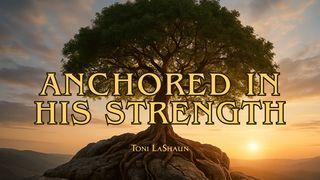Stories Jesus Told Pt.1 نموونە


Reading the Bible the Right Way
When I set out to write today’s devotional, I was looking for a word from the Spirit. That’s always my aim—find out what the Lord wants to say to his people (including me) and then communicate it using simple language and relatable examples.
My process involves reading the verse in multiple versions and in its original language—Greek, in this case—and looking into the literal meanings of the words in the passage. This led me to look into the mustard seed. Initially, I was planning to write something about patience. Like all my fellow millennials, I turned to Google. I searched, ‘How long does it take for a mustard seed to grow into a tree?’ The response, a short period of time—no more than 100 days—so a patience revelation, whilst true more generally, couldn’t be what Jesus wanted to convey in this passage.
More surprisingly, I found out a mustard seed doesn’t actually grow into a tree—it grows into a plant. Now I am wondering, what exactly is Jesus talking about? This example didn’t add up. But then I was reminded of something I learnt during my theology degree years ago. Rather than trying to make the passage fit my revelation and circumstances, to understand this passage I needed to put myself in the shoes of the people listening to Jesus more than 2,000 years ago. I also needed to ask myself: What was Jesus trying to do when he spoke in parables? Who was he speaking to?
Jesus was talking to a group of people who were familiar with farming and agriculture. He wasn’t trying to teach botany. All he was trying to teach them was that the kingdom of heaven is like this very small thing they recognised that grows into something a lot bigger over time. It made sense to the people then, and the meaning is still conveyed to us today.
Reading this passage, I was reminded that there is a context to the passages in the Bible. If we choose to ignore it, we may find ourselves forcing revelations that don’t exist, trying to fit them into our own narratives, interpretations, culture, and understanding. The Bible, its context, and its time have their own unique voice. When we choose to subdue this or force it to fit what we want it to say, we risk reading the Bible the wrong way and falling into the trap Paul warned against. It isn’t good enough to divide the word of truth—we have to learn to rightly divide the word of truth!
2 Timothy 2:15 - “Be diligent to present yourself approved to God, a worker who does not need to be ashamed, rightly dividing the word of truth.”(NKJV)
Questions for reflection: Am I allowing the Bible to have its own voice? Am I forcing a revelation that isn’t there? Have I considered the context that the passage was written in? Am I rightly dividing the word of truth?
If you enjoyed this, you’ll love my weekly devotional, helping you digest the Bible into short practical nuggets of wisdom. Sign up here.
کتێبی پیرۆز
دەربارەی ئەم پلانە

Jesus told stories not just to teach—but to help us see. In this 7-day devotional, we’ll explore His parables and reflect on what they reveal about God, our hearts, and everyday life. Through short readings, Scripture, and honest questions, this plan invites you to pause, listen, and respond. Whether you're in a season of waiting, seeking growth, or needing direction, these simple but powerful stories invite us to hear Jesus more clearly—and to follow Him more closely.
More









